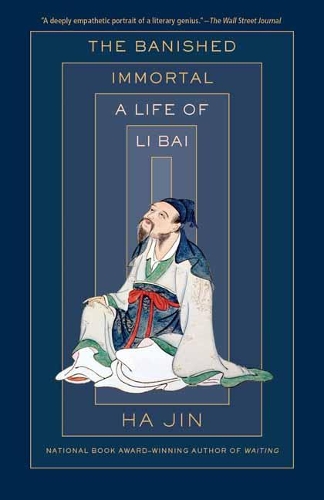
The Banished Immortal: A Life of Li Bai (Li Po)
(Paperback)
Publishing Details
The Banished Immortal: A Life of Li Bai (Li Po)
By (Author) Ha Jin
Random House USA Inc
Vintage Books
3rd December 2019
18th November 2019
United States
Classifications
General
Non Fiction
B
Physical Properties
Paperback
320
Width 132mm, Height 203mm
Description
From the National Book Award-winning author of Waiting- a narratively driven, deeply human biography of the Tang dynasty poet Li Bai-also known as Li Po In his own time (701-762), Li Bai's poems-shaped by Daoist thought and characterized by their passion, romance, and lust for life-were never given their proper due by the official literary gatekeepers. Nonetheless, his lines rang out on the lips of court entertainers, tavern singers, soldiers, and writers throughout the Tang dynasty, and his deep desire for a higher, more perfect world gave rise to his nickname, the Banished Immortal. Today, Bai's verses are still taught to China's schoolchildren and recited at parties and toasts; they remain an inextricable part of the Chinese language. With the instincts of a master novelist, Ha Jin draws on a wide range of historical and literary sources to weave the great poet's life story. He follows Bai from his origins on the western frontier to his ramblings travels as a young man, which were filled with filled with striving but also with merry abandon, as he raised cups of wine with friends and fellow poets. Ha Jin also takes us through the poet's later years-in which he became swept up in a military rebellion that altered the course of China's history-and the mysterious circumstances of his death, which are surrounded by legend. The Banished Immortal is an extraordinary portrait of a poet who both transcended his time and was shaped by it, and whose ability to live, love, and mourn without reservation produced some of the most enduring verses.
Reviews
"A deeply empathetic portrait of a literary genius whose vicissitudes in life . . . would pale a Shakespearean drama. The Wall Street Journal
Ha Jin narrates the poets unusual life with erudition. . . .Writing about Li Baihis life, his work, and his countryJin finally returns home.The New Yorker
A fluently told story, mysterious yet familiar, tragic yet sometimes comical. Ha Jin is a master storyteller.Robert Pinsky
Ha Jin tells Lis story with insight and empathy. The New Yorker (briefly noted)
An affectionate and thoughtful portrait of a complicated man and a master poet. . . . American readers Western bias has left the Chinese poet Li Bai less well-known here than in his native land, where he is considered a foundational writer. [The Banished Immortal] is a worthy corrective and an engaging introduction to the poets life and work. BookPage
Ha Jins masterful style and deep affection for his subject make the book a pleasure to read. . . A number of readers will pick up this book knowing its author but not Li Bai, and Ha Jin makes sure they see Bais prodigious talent. Shelf Awareness (starred review)
A taut introduction to the life and poetry of the influential eighth-century Daoist poet . . . Ha Jins polished biography will give a wider audience access to the politics and beauty of a major Chinese poet. Publishers Weekly (starred review)
Award-winning novelist and poet Jin offers a glimpse into the life of one of Chinas most celebrated poets . . . Scholarly and emotionally engaging . . . Essential. Library Journal (starred review)
[Bais] life as distinguished poet and fiction writer Ha Jin so limpidly relays it was peripatetic. . . . Yet he was an unstaunchable fount of poems of friendship, drinking, dancing, nostalgia, and regret. . . . Bai still stands, with his friend Du Fu, at the pinnacle of Chinese poetry, and his influence is extensive the world over. Booklist
Author Bio
HA JIN left his native China in 1985 to attend Brandeis University. He is the author of eight novels, four story collections, four volumes of poetry, and a book of essays. He has received the National Book Award, two PEN/Faulkner Awards, the PEN/Hemingway Foundation Award, the Asian American Literary Award, and the Flannery O'Connor Award for Short Fiction. In 2014 he was elected to the American Academy of Arts and Letters. He lives in the Boston area and is a professor at the creative writing program at Boston University.
